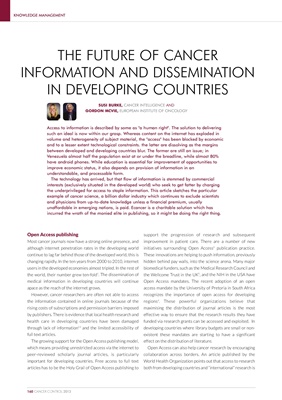
KNOWLEDGE MANAGEMENT
THE FUTURE OF CANCER
INFORMATION AND DISSEMINATION
IN DEVELOPING COUNTRIES
SUSI BURKE, CANCER INTELLIGENCE AND
GORDON MCVIE, EUROPEAN INSTITUTE OF ONCOLOGY
Access to information is described by some as "a human right". The solution to delivering
such an ideal is now within our grasp. Whereas content on the internet has exploded in
volume and heterogeneity of subject material, the "access" has been blocked by economic
and to a lesser extent technological constraints. the latter are dissolving as the margins
between developed and developing countries blur. The former are still an issue; in
Venezuela almost half the population exist at or under the breadline, while almost 80%
have android phones. While education is essential for improvement of opportunities to
improve economic status, it also depends on provision of information in an
understandable, and processable form.
The technology has arrived, but that flow of information is stemmed by commercial
interests (exclusively situated in the developed world) who seek to get fatter by charging
the underprivileged for access to staple information. This article sketches the particular
example of cancer science, a billion dollar industry which continues to exclude scientists
and physicians from up-to-date knowledge unless a financial premium, usually
unaffordable in emerging nations, is paid. Ecancer is a charitable solution which has
incurred the wrath of the monied elite in publishing, so it might be doing the right thing.
Open Access publishing support the progression of research and subsequent
Most cancer journals now have a strong online presence, and improvement in patient care. There are a number of new
although internet penetration rates in the developing world initiatives surrounding Open Access4 publication practice.
continue to lag far behind those of the developed world, this is These innovations are helping to push information, previously
changing rapidly. In the ten years from 2000 to 2010, internet hidden behind pay walls, into the science arena. Many major
users in the developed economies almost tripled. In the rest of biomedical funders, such as the Medical Research Council and
1
the world, their number grew ten-fold . The dissemination of the Wellcome Trust in the UK5, and the NIH in the USA have
medical information in developing countries will continue Open Access mandates. The recent adoption of an open
apace as the reach of the internet grows. access mandate by the University of Pretoria in South Africa
However, cancer researchers are often not able to access recognizes the importance of open access for developing
the information contained in online journals because of the regions6. These powerful organizations believe that
rising costs of subscriptions and permission barriers imposed maximising the distribution of journal articles is the most
by publishers. There is evidence that local health research and effective way to ensure that the research results they have
health care in developing countries have been damaged funded via research grants can be accessed and exploited. In
2,3
through lack of information and the limited accessibility of developing countries where library budgets are small or non-
full text articles. existent these mandates are starting to have a significant
The growing support for the Open Access publishing model, effect on the distribution of literature.
which means providing unrestricted access via the internet to Open Access can also help cancer research by encouraging
peer-reviewed scholarly journal articles, is particularly collaboration across borders. An article published by the
important for developing countries. Free access to full text World Health Organization points out that access to research
articles has to be the Holy Grail of Open Access publishing to both from developing countries and “international” research is
160 CANCER CONTROL 2013